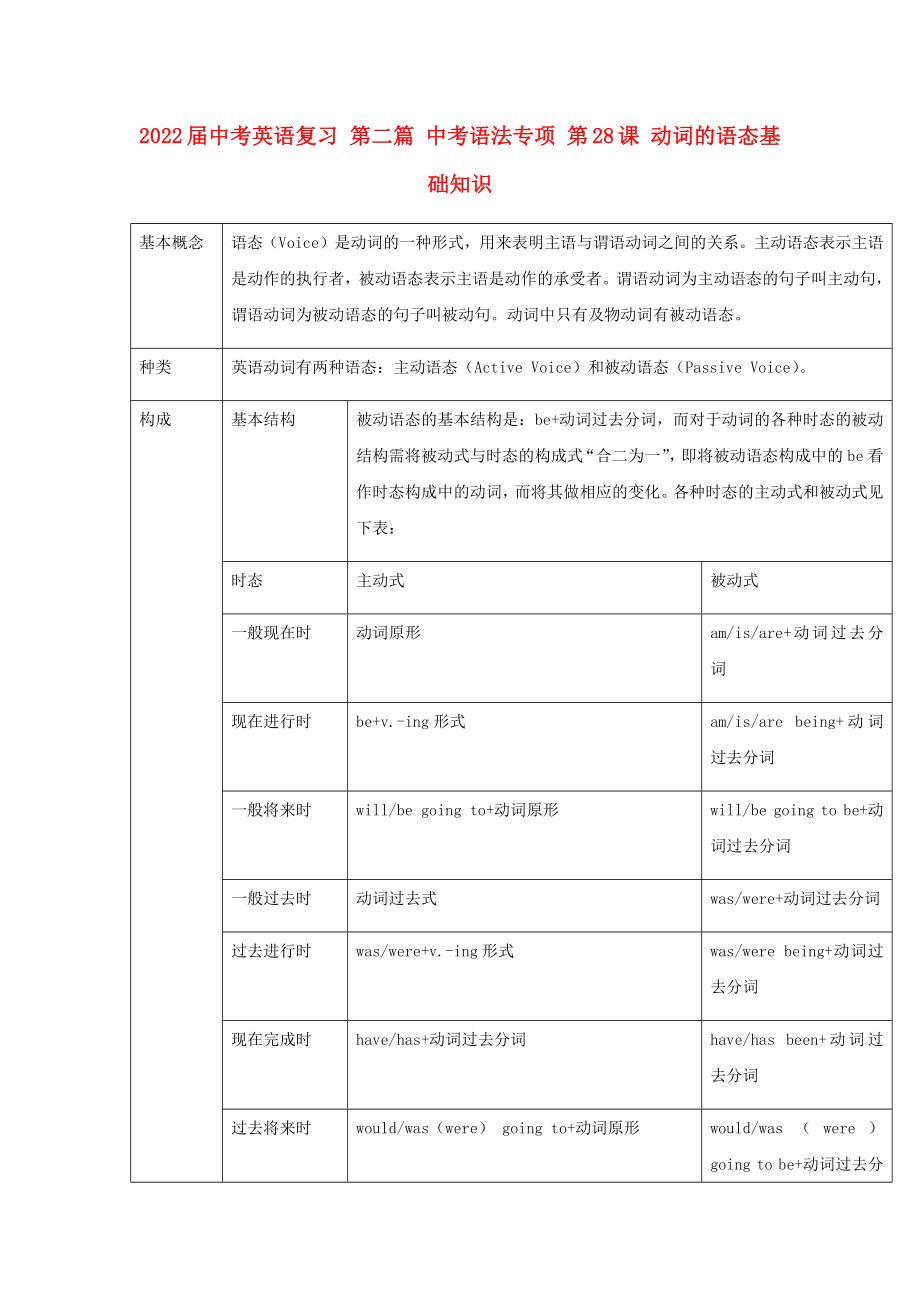《2022屆中考英語復(fù)習(xí) 第二篇 中考語法專項(xiàng) 第28課 動詞的語態(tài)基礎(chǔ)知識》由會員分享�,可在線閱讀,更多相關(guān)《2022屆中考英語復(fù)習(xí) 第二篇 中考語法專項(xiàng) 第28課 動詞的語態(tài)基礎(chǔ)知識(7頁珍藏版)》請在裝配圖網(wǎng)上搜索�。
1、2022屆中考英語復(fù)習(xí) 第二篇 中考語法專項(xiàng) 第28課 動詞的語態(tài)基礎(chǔ)知識
基本概念
語態(tài)(Voice)是動詞的一種形式��,用來表明主語與謂語動詞之間的關(guān)系���。主動語態(tài)表示主語是動作的執(zhí)行者��,被動語態(tài)表示主語是動作的承受者�����。謂語動詞為主動語態(tài)的句子叫主動句���,謂語動詞為被動語態(tài)的句子叫被動句。動詞中只有及物動詞有被動語態(tài)��。
種類
英語動詞有兩種語態(tài):主動語態(tài)(Active Voice)和被動語態(tài)(Passive Voice)���。
構(gòu)成
基本結(jié)構(gòu)
被動語態(tài)的基本結(jié)構(gòu)是:be+動詞過去分詞�����,而對于動詞的各種時態(tài)的被動結(jié)構(gòu)需將被動式與時態(tài)的構(gòu)成式“合二為一”�����,即將被動語態(tài)構(gòu)成中的be看作時態(tài)構(gòu)
2�、成中的動詞,而將其做相應(yīng)的變化��。各種時態(tài)的主動式和被動式見下表:
時態(tài)
主動式
被動式
一般現(xiàn)在時
動詞原形
am/is/are+動詞過去分詞
現(xiàn)在進(jìn)行時
be+v.-ing形式
am/is/are being+動詞過去分詞
一般將來時
will/be going to+動詞原形
will/be going to be+動詞過去分詞
一般過去時
動詞過去式
was/were+動詞過去分詞
過去進(jìn)行時
was/were+v.-ing形式
was/were being+動詞過去分詞
現(xiàn)在完成時
have/has+動詞過去分詞
have/has been+動
3�、詞過去分詞
過去將來時
would/was(were) going to+動詞原形
would/was(were) going to be+動詞過去分詞
過去完成時
had+動詞過去分詞
had been+動詞過去分詞
情態(tài)動詞
情態(tài)動詞+動詞原形
情態(tài)動詞+be+動詞過去分詞
基本用法
1. 不知道動作的執(zhí)行者是誰,或沒有必要指出動作的執(zhí)行者時用被動語態(tài)��。如:
①Letters are collected at eight every morning. 信件每天早晨8點(diǎn)被收取�����。
②His bike has been stolen. 他的自行車已經(jīng)被偷走了���。
2.
4�、為了強(qiáng)調(diào)或突出動作的承受者時用被動語態(tài)。如:
①The bag was taken away by his elder sister. 那個包被他姐姐拿走了。
②The plan has already been made. 計劃已經(jīng)制定好了�。
3. 在上下文中,為了使句子間銜接緊密���,常用被動語態(tài)��。如:I have a new motorbike. It was given to me as a birthday present by my father. 我有輛新摩托車���。它是父親作為生日禮物送給我的��。
主動語態(tài)和被動語態(tài)的轉(zhuǎn)換
1. 主動語態(tài)變?yōu)楸粍诱Z態(tài)時���,應(yīng)注意三個方面:
(1
5、)把主動語態(tài)的賓語改為被動語態(tài)的主語,若是代詞,要變賓格為主格�����。
(2)把主動語態(tài)的謂語動詞改為相應(yīng)的被動語態(tài)結(jié)構(gòu):be+及物動詞的過去分詞���,放在主語之后��。
(3)把主動語態(tài)的主語改為“by+原主語(若是代詞,要變主格為賓格)”�����,放在主謂結(jié)構(gòu)之后���。在意思明確時by短語可以省略�。如:
2. 含有雙賓語的句子由主動語態(tài)變?yōu)楸粍诱Z態(tài)時有兩種情況:
(1)把間接賓語改為被動語態(tài)的主語���,直接賓語仍留在原來的位置��。
(2)把直接賓語改為被動語態(tài)的主語�����,此時���,間接賓語前要加介詞to或for��。如:
He gave the boy an apple. →The boy was given an
6�����、apple by him. 或An apple was given to the boy by him. 他給了這個男孩一個蘋果�。
3. 若動詞短語是不可分割的整體�����,改為被動語態(tài)時��,要保持其完整性��,介詞或副詞不可漏掉。如:
We must take good care of the young trees.→The young trees must be taken good care of. 我們必須好好照顧這些小樹。
4. 主動語態(tài)中感官動詞feel, hear, see, watch等以及某些使役動詞make, have, let后須跟省略to的動詞不定式作賓語補(bǔ)足語,改為被動語態(tài)
7���、時,不定式前要加to。如:
We saw the children sing that morning. →The children were seen to sing that morning. 那天早晨我們看見孩子們唱歌了。
5. 有些被動語態(tài)結(jié)構(gòu)是習(xí)慣用法�。如:It is said that...據(jù)說……;It is/was reported that...據(jù)報道……�;It is well-known that... 眾所周知……�;It is believed that... 人們都相信……。
主動形式表示被動意義的情況
1. 某些由及物動詞轉(zhuǎn)化而來的不及物動詞,如read, w
8�����、rite, clean, wash, draw, cut, open, sell等��,常與副詞well, easily, smoothly等連用�,且通常用主動結(jié)構(gòu)表示被動意義。如:The pen writes well. 這支鋼筆很好用�。
2. 動詞need, require, want, deserve等后接v.-ing的主動結(jié)構(gòu)表示被動意義,相當(dāng)于sth. need(s)/require(s)/want(s)/deserve(s) to be done�。如:The car needs cleaning. 這輛汽車需要清洗了。
3. 有些動詞如cook, print等�����,常用主動結(jié)構(gòu)表示被動
9���、意義�。如:The lunch is cooking. 正在做午飯���。
4. 某些連系動詞如feel, prove, smell, taste, sound等加上形容詞�,也可用主動式表示被動意義���。如:The food tastes delicious. 這種食物嘗起來很美味�。
5. be worth doing意為“值得做”,表示被動含義��。如:The book is worth reading. 這本書值得一讀�。
不用被動語態(tài)的5種情況
1. 謂語為連系動詞時,不用被動語態(tài)���。如:He looks fine. 他氣色很好���。
2. 謂語為不及物動詞(短語)時,不用被動語態(tài)�����。如:
①The
10��、war broke out in the end. 戰(zhàn)爭終于爆發(fā)了��。
②I happened to meet him there. 我碰巧在那兒見到了他���。
3. 賓語為動詞不定式、v.-ing形式或從句�����,表示主語的一些想法、愛好或愿望時���,一般不用被動語態(tài)�。如:
①He decided to go with us. 他決定跟我們一起去�����。
②I want to buy a puter. 我想買一臺電腦���。
4. 賓語是相互代詞���、反身代詞、同源賓語等時���,一般不用被動語態(tài)�����。如:
①We should help each other. 我們應(yīng)該相互幫助�。
②He thinks of hims
11�、elf too much. 他為自己考慮得太多�����。
③We live a happy life here. 我們在這兒過著幸福的生活��。
5. 賓語表示處所���、地點(diǎn)時,一般不用被動語態(tài)��。如:
①We will reach the station in two hours. 我們兩個小時內(nèi)就到站了��。
②He has gone to London. 他去倫敦了��。
當(dāng)堂檢測
一���、用所給動詞的適當(dāng)形式填空��。
1. (xx·臺州)I handed in my test paper and the last question__________ (leave) unanswered.
2. Yo
12��、u may go fishing if your work__________ (do).
3. A terrorist attack__________(happen)at Kunming Railway Station, and 29 people__________ (kill) in the event.
4. Although everyone wants to succeed in what he tries to do, sometimes failure can’t__________ (avoid).
5. —How soon__________ all the wor
13���、k__________(finish)?
—In a week.
6. —Tell me one thing you’re proud of in your junior high school.
—I was__________(choose) as captain of the school football team.
7. I will finish the work if I__________(give) another ten minutes.
二、用方框中所給詞的適當(dāng)形式填空��,每詞限用一次�。(xx·諸暨中考模擬)
among mad two my sepa
14、rate
1. Although Jane’s schoolbag is very nice, I still prefer__________.
2. Tom is such a lazy boy that he exercises only a year.
3. Nowadays, many students are__________ from each other by iPads.
4. Heart trouble is the most serious reason of death__________ old people.
5. How strange he i
15���、s!Maybe he is the__________ man Ihave ever seen.
三���、任務(wù)型閱讀。(xx·湖州市南潯區(qū)中考模擬)
下面是Maria的一封求職信���。假設(shè)你是經(jīng)理Mr. Green��,請根據(jù)求職信內(nèi)容��,完成Maria的應(yīng)聘條件分析圖(每空限填一詞)��。
Dear Mr. Green,
I am attracted by your advertisement(廣告) and I would like to work with you from July to September.
I am a 19-year-old Portuguese(葡萄牙的) stude
16�、nt and now I am studying at Porto University, in the north of Portugal. I have studied English since I was 8 years old, so I can speak English very well. I have been to England twice where I attended two summer courses.
I feel I would be suitable(合適的) for the job. I love children and I am good at p
17���、laying with them. So I am popular with the children. Besides, I love sports and I exercise every day, so I can take part in any sports activities.
I have some work experience and have already done a few part-time jobs during summer holidays. Last summer I worked in a primary school to take care of
18�、school children while some teachers were on holiday. I also babysit for my neighbors when they need help.
I am looking forward to your reply.
Yours,
Maria Gonzales
參考答案
當(dāng)堂檢測
一��、1. was left 2. is done 3. happened, were killed
4. be avoided
5. is, going to be finished 【解析】問句的主語是all the work��,所以應(yīng)該用被動語態(tài),且由how soon可知應(yīng)該用一般將來時的被動語態(tài)�����。
6. chosen 7. am given
二�����、1. mine 2. twice 3. separated
4. among 5. maddest
三�、1. student 2. England 3. well
4. experience
 2022屆中考英語復(fù)習(xí) 第二篇 中考語法專項(xiàng) 第28課 動詞的語態(tài)基礎(chǔ)知識
2022屆中考英語復(fù)習(xí) 第二篇 中考語法專項(xiàng) 第28課 動詞的語態(tài)基礎(chǔ)知識

